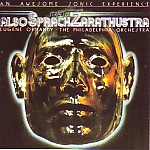Eugene Ormandy recorded Zarathustra a whole bunch of times for at least three labels: CBS, RCA, and EMI (the last time an early digital recording). He always played the piece well, but this RCA version probably was the best of them–it also sounded terrific on the less-than-fabulous systems that I and my high school chums owned, and it’s still pretty impressive for RCA working in Philly. This is one of the few versions that doesn’t get duller as it goes: the finale Dance Song (Tanzlied), and the culminating banging of the midnight bell, really does constitute the climax of the piece, and of course it’s fabulously played.
Don Quixote never was Ormandy’s strongest effort in Strauss, though it’s nice to have the excellent Philadelphia first-desk players taking the solo parts rather than more famous “ringers”. What this performance lacks, however nicely played, is humor, as well as contrast between the variations. It’s not dull, but Ormandy’s full-steam-ahead approach doesn’t make enough out of, say, the sheep, or the flight through the air, or even the Don’s death. Still, this is a valuable release in Japanese RCA’s Ormandy edition, available on-demand from Arkivmusic.com.
































